The TP-Link Deco X90 is a stylish mesh Wi-Fi 6 system that offers fast throughput speeds, multi-gigabit networking, and TP-Link’s HomeShield security software.
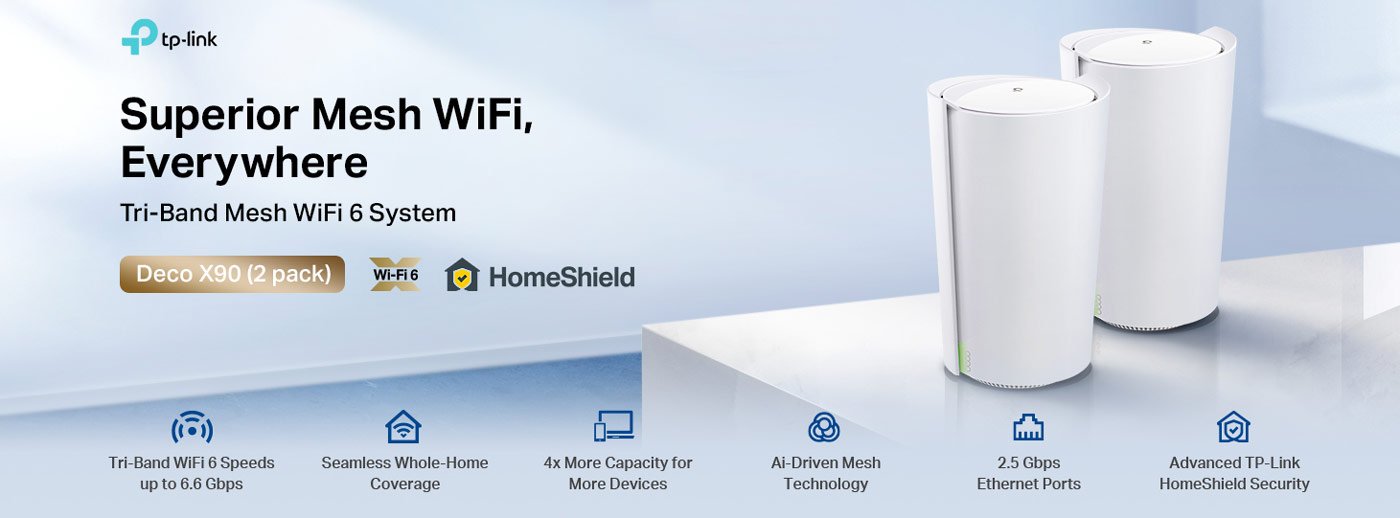
TP-Link Deco X90 Pros and Cons
TP-Link Deco X90 Design
The TP-Link Deco X90 consists of two identical cylindrical nodes that, when combined, provide coverage for up to 6,000 square feet (slightly larger than the XT8’s 5,500 square feet). They stand 210 millimetres tall with a maximum diameter of 130 millimetres and feature a matte white finish. Each node is equipped with two auto-sensing Ethernet ports, one of which is a 2.5GbE port (the other is a 1GbE port), but like most mesh systems, there are no USB ports. Near the base, there is a glowing LED that changes colour to indicate system status: yellow indicates booting up, flashing red indicates no internet or mesh connection, green indicates everything is normal, flashing red LED indicates the node has disconnected from the main router, and a steady red LED indicates a network issue.
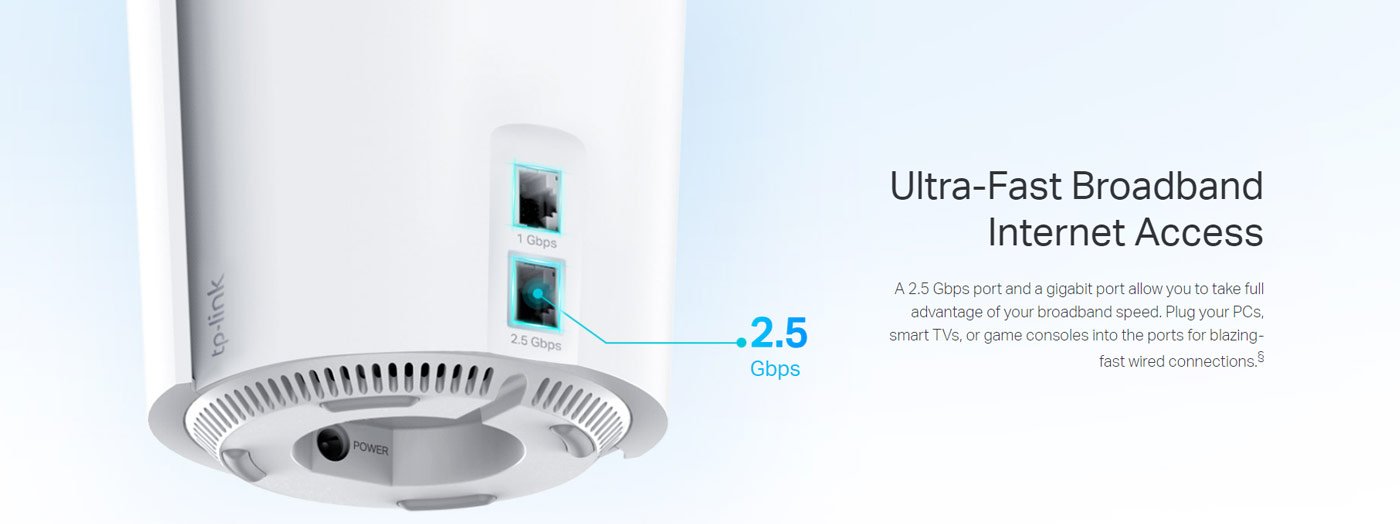
Each node is equipped with six built-in antennas, a 1.5GHz quad-core CPU, 802.11k/v/r mesh network circuitry, and 802.11ax network circuitry. Deco X90 supports all the latest Wi-Fi 6 technologies, including MU-MIMO simultaneous data streams, OFDMA packet transmission, beamforming directly to clients, Smart Connect automatic band control, WPA3 encryption, and 160MHz channel bandwidth. This is a tri-band AX6600 system, with a maximum data rate of 574Mbps on the 2.4GHz band, 1,201Mbps on one 5GHz band, and 4,804Mbps on the other 5GHz band. You can use the Ethernet port for wired backhaul or one of the 5GHz bands for processing.
The TP-Link Deco X90 is equipped with TP-Link’s HomeShield Basic security software, which offers a range of parental control features, including age-based web filtering, website blocking, and bedtime shutdown schedules. However, you must subscribe to the HomeShield Pro plan, priced at $5.99 per month or $54.99 per year, to access advanced features such as time limits, time rewards, and traffic statistics reports. The Pro plan also provides protection against virus attacks, phishing schemes, and other malware, as well as real-time protection for all your smart home devices. This is less expensive than the HomePass subscription required for the Plume SuperPod with Wi-Fi 6 (USD 99 per year, USD 179 for two years, or USD 249 for three years), but more than the lifetime free network protection offered by the ASUS ZenWiFi AX XT8.
TP-Link Deco X90 Feature
- AX6600 Tri-Band WiFi 6 Mesh – Boosts overall speeds up to an incredible 6600 Mbps (4804 Mbps at 5GHz 1, 1201 Mbps at 5GHz 2, and 574 Mbps at 2.4GHz); Each Deco Unit has 2 Ethernet Ports (1x 2.5Gbps Port, 1 x Gigabit Port)
- Whole Home WiFi Coverage – Cover up to 6000 square feet with seamless high-performance Wi-Fi 6 and eliminate dead zones and buffering, better than traditional wifi boosters
- Connect More Devices – Connect up to 200 devices without slowing down performance
- AI-Driven Mesh – Intelligently learns the network environment to provide ideal Wi-Fi tailored to your home
- Smart Antennas – Establish a stronger backhaul to enhance coverage and improve wireless connections
- TP-Link HomeShield – TP-Link’s premium security service safeguards your home network with cutting-edge network and IoT protection. Free features: 1. Basic Network Security including Security Scan and IoT Device Identification 2. Basic Parental Controls 3. Quality of Service 4. Basic Weekly/Monthly Reports.
- Each Deco X90 has 2 Gigabit Ethernet ports (4 in total for a 2-pack) and supports Wired Ethernet Backhaul for better speeds. Any of them can function as a Wi-Fi router. Compatible with all internet service providers, such as AT&T, Verizon, Xfinity, Spectrum, RCN, Cox, CenturyLink, Frontier, etc. (A modem is required for most internet service providers)
TP-Link Deco X90 Specifications
| Brand | TP-Link |
| Model Name | Deco X90(2-pack) |
| Special Feature | QoS, Guest Mode, Access Point Mode, Internet Security, Remote Access, Parental Control |
| Frequency Band Class | Tri-Band |
| Standards and Protocols | Wi-Fi 6 IEEE 802.11ax/ac/n/a 5 GHz IEEE 802.11ax/n/b/g 2.4 GHz |
| WiFi Speeds | AX6600 5 GHz: 4804 Mbps (802.11ax, HE160) 5 GHz: 1201 Mbps (802.11ax) 2.4 GHz: 574 Mbps (802.11ax) |
| WiFi Range | 4-6+ Bedroom Houses (2-pack) |
| Guest Network | 1× 5 GHz Guest Network 1× 2.4 GHz Guest Network |
| Dimensions (W×D×H) | 5.1 × 4.8 × 8.3 in (130 × 123 × 210 mm) |
| Compatible Devices | Gaming Console, Personal Computer, Printer, Security Camera, Smart Television, Smartphone, Tablet |
| Recommended Uses For Product | Home, Gaming |
| Included Components | 1 RJ45 Ethernet Cable, 2 Power Adapters, 2 Deco X90 Units, 1 Quick Installation Guide |
TP-Link Deco X90 Performance
The TP-Link Deco X90 achieved impressive results in our throughput performance tests. In our close-range (same room) tests, the main router achieved a speed of 888Mbps, one of the highest speeds we’ve seen in a mesh system, though the difference is minimal. It outperforms the Asus ZenWiFi AX XT8 (860Mbps), Linksys Velop AX MX106000 (865Mbps), and Netgear Orbi AX6000 RBK852 (862Mbps). However, in the 30-foot test, the X90’s speed was 305Mbps, slightly slower than its competitors. The Asus ZenWiFi AX XT8 led with 347Mbps, followed by the Linksys Velop AX6000 at 333Mbps and the Netgear Orbi AX6000 RBK852 at 324Mbps.
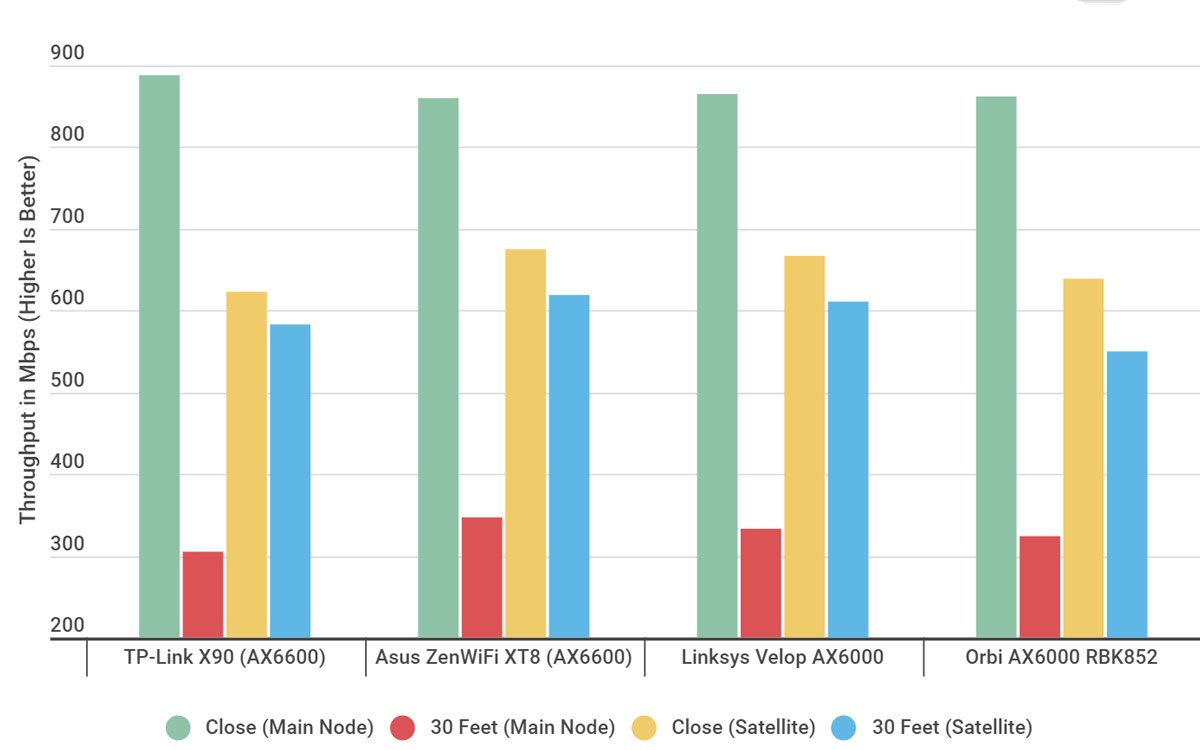
The Deco X90 satellite node achieved a respectable 623Mbps speed in close-range testing, just behind the Netgear Orbi AX6000 RBK852 (639Mbps). The Linksys Velop AX6000 clocked in at 667Mbps, while the Asus ZenWiFi AX XT8 led the pack with 675Mbps. At a distance of 30 feet (approximately 9 metres), the X90 outperformed the Netgear Orbi AX6000 RBK852 (550Mbps) with a speed of 583Mbps, but fell slightly short of the Linksys Velop AX6000 (611Mbps). The Asus ZenWiFi AX XT8 once again took the top spot with a speed of 619Mbps.
TP-Link Deco X90 Setup
The Deco smartphone app guides you quickly through the setup of the Deco X90 system and handles subsequent network management. You can use it to view connected devices, enable or disable the main network and guest network, configure address reservation and port forwarding, and assign priority and parental control settings for each device. The app also displays notifications to alert you when new devices connect and inform you of security scan results. Since remote access is enabled by default, you can stay updated without connecting to the Deco network.
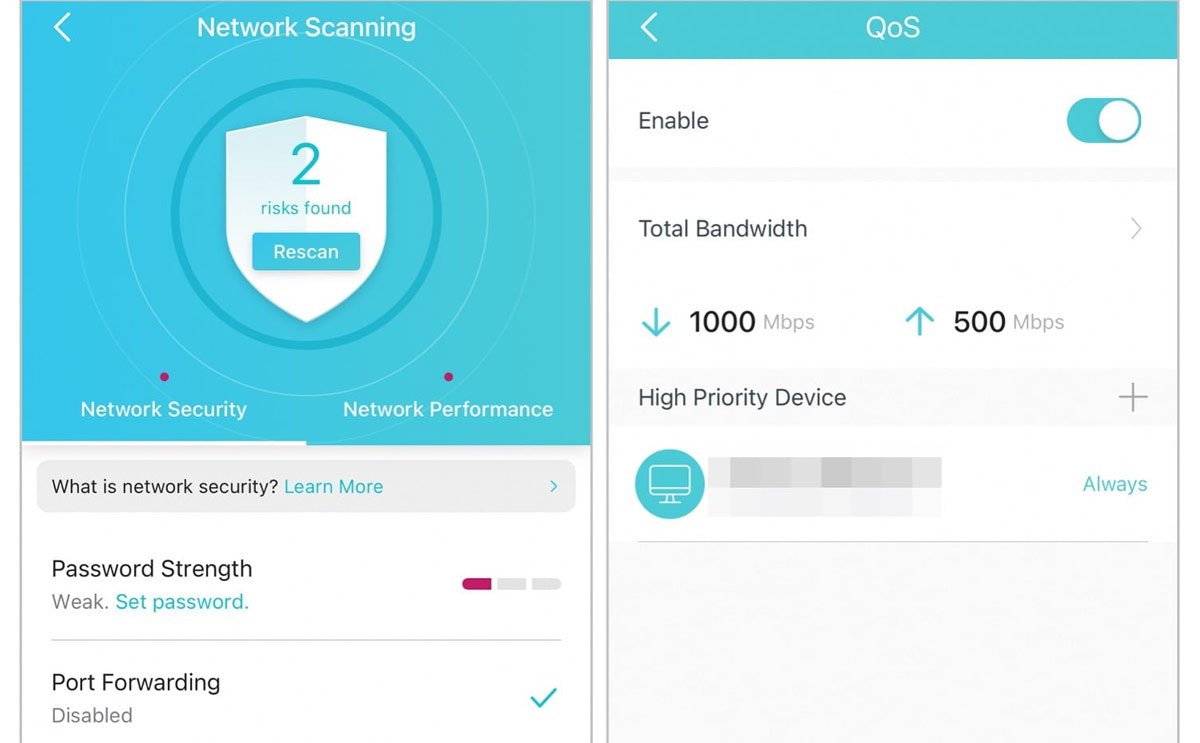
The HomeShield page offers network security and parental control features. Basic features are free, including manual security scans, category-based website filtering, and enforced bedtime settings. Subscribing to HomeShield Pro for £54 per year unlocks router-based dangerous website and content blocking features, more flexible time limits in the parental control module, and extensive reports on customer online activity—visit the TP-Link website for the full list of HomeShield features.
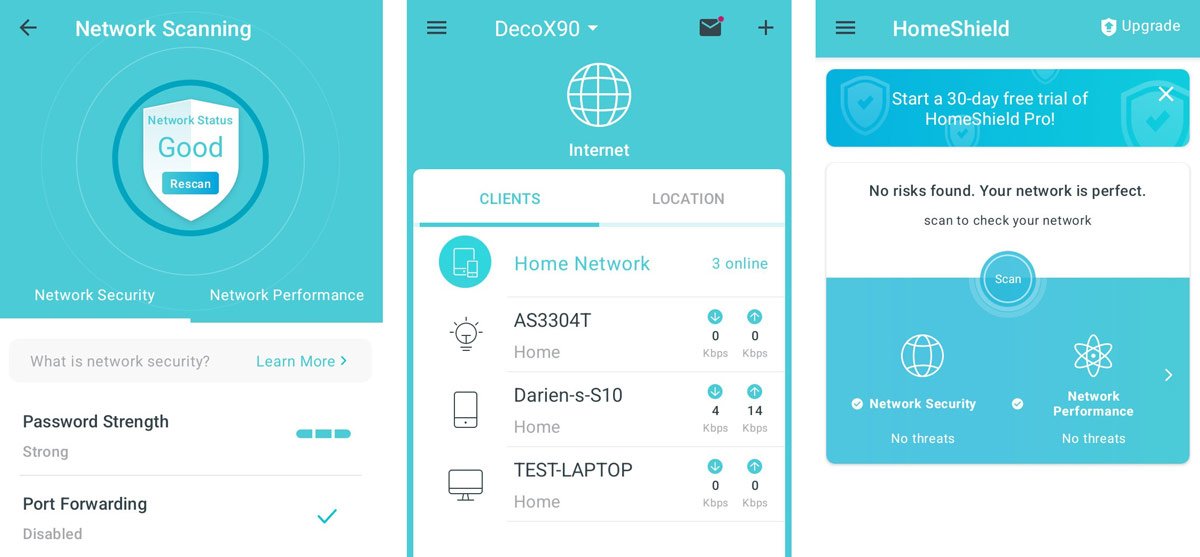
Interestingly, the Deco app also integrates with a range of smart devices, including Philips Hue, Samsung SmartThings, and TP-Link’s own Kasa platform, so you can use the app to turn on lights, control smart switches, and even set up simple automations, such as turning on lights whenever your smartphone connects to the Deco network.




 Amazon.com
Amazon.com 



